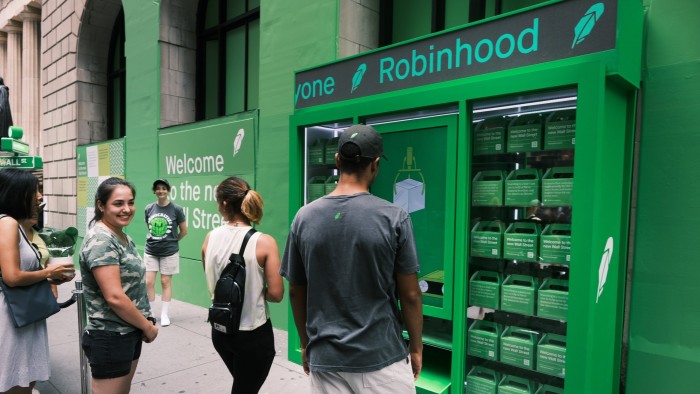Unlock the Editor’s Digest for free
Roula Khalaf, Editor of the FT, selects her favourite stories in this weekly newsletter.
Once upon a time, Robinhood merely offered trading in companies with outlandish valuations. Now, the online broker has become one itself. Founder Vlad Tenev is building a fast-expanding empire whose affinity with cryptocurrencies fits the current political mood. At 72 times this year’s forecast earnings, investors are making some heroic assumptions.
Shares in Robinhood have risen 150 per cent this year, buoyed not only by the seemingly irrepressible trading activity of its retail investor customers, but also by expectations that once cryptocurrencies are regulated, mainstream investors will embrace them. A fifth of the company’s share price gains have come since Tenev fronted a swanky event in the south of France last week to launch more crypto capabilities and to give away $1mn of tokens linked to stakes in OpenAI and SpaceX.
Analysts have factored in about 10 per cent growth in earnings per year for Robinhood out to 2028, according to forecasts gathered by S&P Capital IQ. That’s hardly the sort of rate to merit such a racy valuation. Some caution in forecasting can be forgiven since net income is a novelty for Robinhood, having notched up only one full year of profit since going public. It is extremely hard to predict the outlook for cryptocurrencies, a market at the legislative whim of US President Donald Trump.
Still, if Robinhood can grow at the forecast pace, it means the shares currently trade on 56 times those future 2028 earnings. Rival Interactive Brokers is on a multiple of 27 and broking behemoth Charles Schwab, with $10tn assets under custody, is valued at 14 times. Put another way, in order to look fairly valued next to Interactive, Robinhood would need to earn double what analysts expect three years from now.
Right now around half of Robinhood’s revenue comes from payments it receives related to customers’ trading activity, a volatile but potentially explosive segment that depends on investors’ mood. The other half comes from interest-related income, which is steadier, but depends to some degree on rates. Income from elsewhere, such as the fee customers pay for Robinhood’s “gold” status, is growing slowly.
Listen to Tenev, and trading is indeed poised for a revolution. His contention is that tokenisation, built on the blockchain, will open up all kinds of new assets that can be bought and sold on Robinhood. Stablecoins backed by US dollars are already an example of tradeable digital tokens tied to a real-world asset. Private company stock tokens, such as those Tenev doled out last week in OpenAI and SpaceX, are the next step on a much longer journey.
This story is compelling enough. But nothing in markets ever moves in a straight line, be that trading activity or prices. There’s a lot happening that makes Robinhood worth watching but its share price at these levels involves using a lot of imagination.
jennifer.hughes@ft.com
https://www.ft.com/content/3b2c214c-3a9d-4c83-9708-73ea20f45b60


